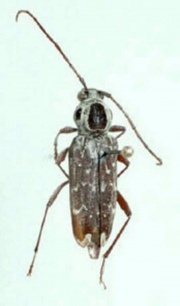Difference between revisions of "House longhorn beetle"
Jump to navigation
Jump to search
m (Text replace - "== Authority ==" to "== Sources Checked for Data in Record ==") |
|||
| Line 10: | Line 10: | ||
File:5315096_Old.house.borer_larvae.jpg|Old house borer | File:5315096_Old.house.borer_larvae.jpg|Old house borer | ||
</gallery> | </gallery> | ||
| − | + | ==Resources and Citations== | |
| − | + | * MuseumPest.net at [https://museumpests.net/ Link] | |
| − | == | ||
* Hermann Kuhn, ''Conservation and Restoration of Works of Art and Antiquities'', Butterworths, London, 1986 | * Hermann Kuhn, ''Conservation and Restoration of Works of Art and Antiquities'', Butterworths, London, 1986 | ||
Latest revision as of 16:02, 9 September 2022
Description
A dull black or brown beetle, Hylotrupes bajulus, with a thin border of white hairs. The house longhorn beetle larvae eat softwoods such as roof and floor timbers. The adult insects fly from June to August. The larvae grow in length to 15 to 20 mm. The larval stage lasts 3 to 11 years causing serious damage to an infested structure. The house longhorn beetle produces large tunnels and emergence holes with an oval cross section 5 to 7 mm in diameter.
Additional Images
Resources and Citations
- MuseumPest.net at Link
- Hermann Kuhn, Conservation and Restoration of Works of Art and Antiquities, Butterworths, London, 1986
- G.Caneva, M.P.Nugari, O.Salvadori, Biology in the Conservation of Works of Art, ICCROM, Rome, 1991


